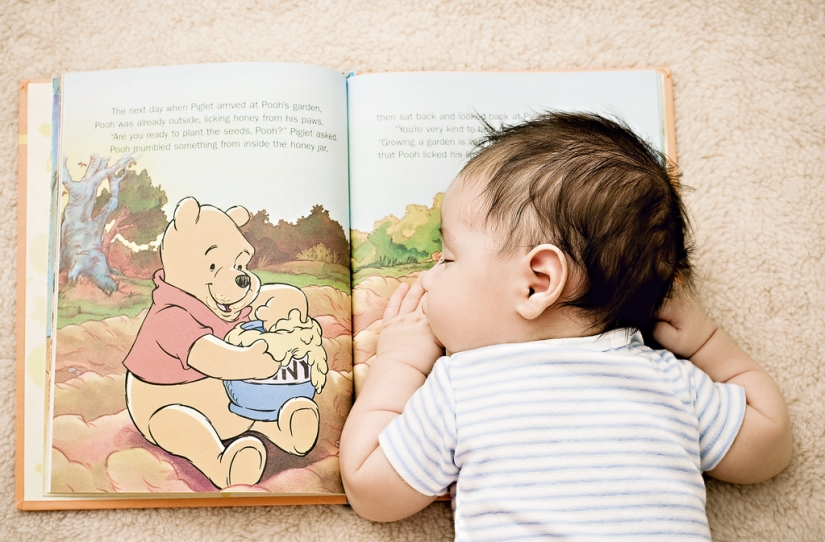8 scientific reasons why you should read books
Categories: Book | People | Psychology | Science | Society | World
By Vika https://pictolic.com/article/8-scientific-reasons-why-you-should-read-books1.htmlWhen e-books hit the market, many predicted a permanent "death" for printed books. Despite all the prophecies, traditional paper books remain as popular as ever, and scientists confirm their beneficial effects on the human body. Find out 8 scientific reasons why you should read books.
8 PHOTOS

1. Reading increases intelligence. As the popular children's book author known as Dr. Seuss once wrote: the more you read, the more you learn. Reading is a comprehensive source of knowledge and from an early age replenishes our vocabulary much more effectively than watching TV or talking to educated interlocutors. And an extensive vocabulary, according to scientists, allows you to better pass not only tests for reading comprehension, but also for the level of intelligence. (Photo: imran*/flickr.com).

2. Reading increases the efficiency of the brain. Frequent reading affects not only the level of knowledge but also the efficiency of our brain. Regular reading improves the condition of brain cells and helps us remember what we read faster. As we age, our brains age and reading books naturally can slow this process down, according to scientists who published their findings in the journal Neurology. And the Huffington Post writes on its pages that reading can reduce the risk of developing mental disorders by up to 32 percent. (Photo: Ryuu竜/flickr.com).

3. Reading teaches empathy (empathy). When reading fiction, the reader has the opportunity to imagine how the characters in the book feel and better understand them, scientists from Science write. Scientists believe that fiction makes us more sensitive than reading non-fiction. Scientists David Comer Kidd and Emanuele Castano argue that understanding the state of mind of other people is the basis that a person needs to function normally in society. (Photo: Frank Crommelin/flickr.com).

4. Reading helps fight Alzheimer's. Reading a book is a kind of training for the brain, stimulating its work. People who read regularly have a two and a half times lower risk of developing Alzheimer's disease compared to non-readers. The more active our brain, the better its condition. A book can be great to stimulate the activity of our brain. What really kills brain cells is passivity (inactivity). (Photo: bonaphoto/flickr.com).

5. Reading books helps you relax. Scientific studies have shown that reading can act as a relaxing agent. Scientists from Sussex University have proven that reading reduces stress by up to 69 percent. It doesn't matter what book you read, the main thing is that it completely captures you. Once in the fictional world of the author, we run away from the anxiety and everyday worries of our own lives, writes David Lewis in The Telegraph. (Photo: — POD -/flickr.com).)

6. Reading helps you fall asleep. Reading traditional books allows the body to relax much better than, for example, reading from a computer or tablet screen, which keeps our brain in a state of concentration longer, which in turn negatively affects sleep. This rule also applies to children. According to Pediatrics, 45 percent of children who had a screen nearby before bed took an average of 20 minutes longer to fall asleep than children who read paper books. (Photo: {Anita}/flickr.com).)

7. Reading is contagious. 75 percent of parents want their children to read more. It turns out that reading is contagious. Children whose parents constantly read books aloud to them most often spend their free time reading. Studies have shown that 40 percent of children aged 6 to 10 who love to read had their parents read books aloud in early childhood. Why does it happen? It turns out that children need to see reading as a potential hobby. (Photo: evaxebra/flickr.com).

8. Turning the pages of a book contributes to a better understanding of it. It is thanks to turning the pages that we better understand the contents of the book we are reading. The Wired report confirms that touching the pages of a book with our hands “introduces” its semantic situation (context) into our brain, thereby allowing us to better understand what we are reading. (Photo: Sareni/flickr.com).
Keywords: Scientific reasons | Books | Reading books | E-books | Scientists | Beneficial effects | Human body | Brain
Post News ArticleRecent articles

It's high time to admit that this whole hipster idea has gone too far. The concept has become so popular that even restaurants have ...

There is a perception that people only use 10% of their brain potential. But the heroes of our review, apparently, found a way to ...
Related articles

There is nothing strange in the fact that certain images and concepts of fear are repeated in the horror genre. Themes of horror ...

Today cheap romance paperback no one takes seriously. This reading is taken to vacation, to read and to ruthlessly discarded. But ...

"Love affair" - for many, this phrase is associated exclusively with low-grade books, where a muscular macho and a languid beauty ...

New Year's is a time to surprise and delight loved ones not only with gifts but also with a unique presentation of the holiday ...